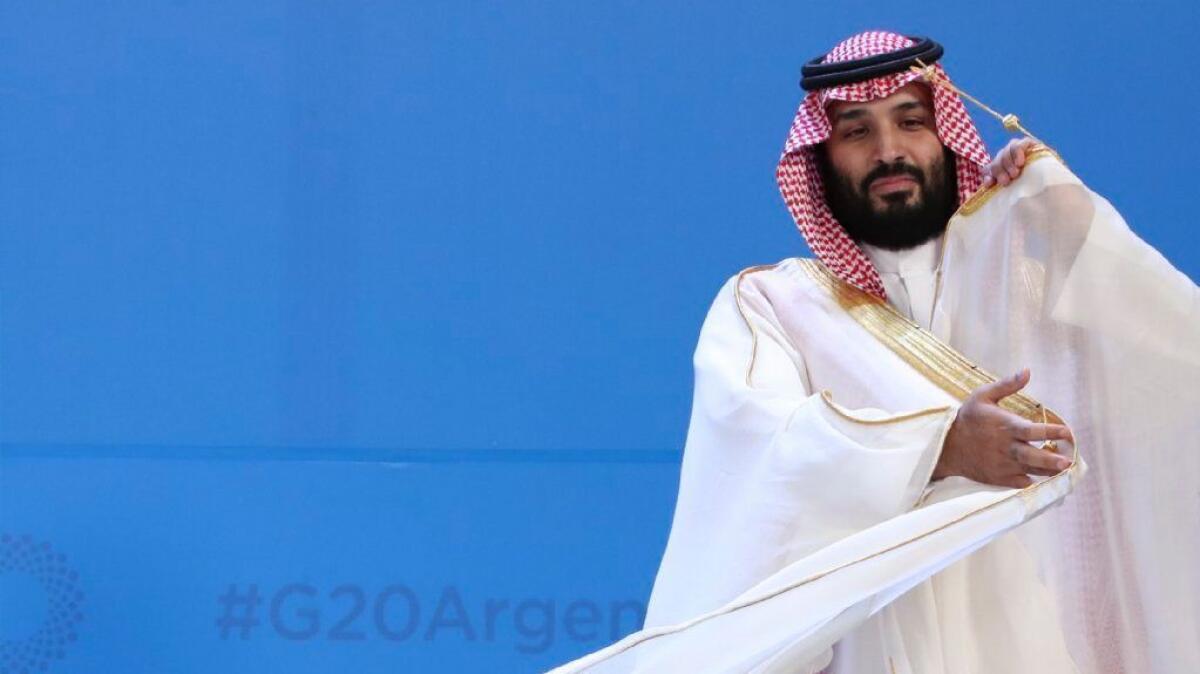Column: The U.S. has a problem in Saudi Arabia, and it’s still not being fixed

Reporting from Washington — Almost six months after Saudi journalist Jamal Khashoggi was murdered, the man believed to have ordered the killing has cemented his position as President Trump’s closest ally in the Arab world.
Crown Prince Mohammed bin Salman, the de facto ruler of Saudi Arabia, has weathered the initial storm over the Oct. 2 killing in the Saudi Consulate in Istanbul, Turkey. Trump and his aides have made clear that they consider the prince an essential U.S. partner in the Middle East.
If they were thinking long-term about American interests, they’d see that he’s also one of their biggest problems.
MBS, as he’s widely known, is an autocrat, a hothead and a disruptor. He’s a younger, Saudi version of Trump — only with fewer checks and balances.
The 33-year-old prince hasn’t done much to stabilize the Middle East. Instead, he’s made the area even less stable — not only by ordering a savage crackdown against dissidents like Khashoggi, but also by bullying other princes, kidnapping Lebanon’s prime minister, imposing an economic blockade on one neighbor, Qatar, and launching a disastrous war against another, Yemen.
When Trump talks about Saudi Arabia under MBS, he extols the kingdom as a buyer of U.S.-manufactured weapons, pointing to deals he claims (with characteristic exaggeration) could reach $110 billion.
“I don’t want to lose an order like that,” he said last year.
Secretary of State Michael R. Pompeo describes the Saudis in more strategic terms, as important allies in counterterrorism and the U.S.-led campaign to pressure Iran.
“It’s a mean, nasty world out there, the Middle East in particular,” Pompeo said. “There are important American interests…. Saudi Arabia [is] an important partner.”
Both make it sound as if the United States faces a single, all-or-nothing choice: stand by MBS, or walk away from the relationship entirely.
“I want to stick with an ally that in many ways has been very good,” Trump said.
But there’s a third alternative, of course — one the United States has often used when leaders of client states acted against U.S. interests. Call it “tough love.”
“You don’t want to walk away from the relationship. What you want to do is improve their behavior,” Robert W. Jordan, a U.S. ambassador to Saudi Arabia under President George W. Bush, told me last week. “I don’t see much of a strategy in place to do that.”
Part of the problem, Jordan said, is that the Trump administration has ceded leverage to the Saudis. “We treat them as if they’re our most valued customer in the world, and the customer’s always right,” he said.
Instead, he said, the administration should make it clear that it’s not happy with some of MBS’ decisions and back up its words with action.
“You have to make it clear that you’re serious about it,” he said. “There are subtle ways we can make clear that they need us more than we need them. Take spare parts. Their F-15s would be grounded in weeks if we held up their spare parts.”
In the months since Khashoggi was killed and his body dismembered, the Trump administration has done nothing like that.
Instead, Trump has questioned whether MBS should be held responsible for the crime, despite a CIA finding (with “medium to high confidence”) that he ordered it.
The administration has been similarly muted about the kingdom’s imprisonment of dissidents, including women’s rights activists who have been subjected to physical abuse and threats of rape.
Even in the case of Dr. Walid Fitaihi, a Saudi American dual citizen who has reportedly been tortured, the United States has said little.
And when it comes to the Saudi intervention in Yemen’s civil war, which MBS launched three years ago, the administration has backed the prince — despite mounting reports of civilian casualties from Saudi airstrikes.
“The way to alleviate the Yemeni people’s suffering is … by giving the Saudi-led coalition the support needed to defeat Iranian-backed rebels,” Pompeo said March 15.
If the administration wanted to send a tough-love message, one way would be to get an ambassador to Riyadh. Trump didn’t nominate a candidate for the job for almost two years; the Republican-led Senate hasn’t yet confirmed his choice, retired Gen. John P. Abizaid.
Abizaid has said he’s willing to talk tough.
“We should speak frankly to our partners when they do wrong,” he said in his Senate confirmation hearing on March 6.
But once he gets to Riyadh, Abizaid will face a problem: MBS has gotten used to doing business directly with Jared Kushner, the president’s son-in-law.
“They have to empower Abizaid; he has to be seen as the president’s man,” said Barbara A. Leaf, a former ambassador to the United Arab Emirates. “You cannot have MBS thinking that all he has to do is call Jared.”
The U.S.-Saudi relationship “needs to be reset,” argues Aaron David Miller, a Middle East expert who worked in both Republican and Democratic administrations. “We are tethering ourselves to a regime that is undermining American interests and American values.”
He acknowledged that it won’t be easy. “How do you identify a policy between abandonment and embrace?”
But it won’t happen at all unless Trump and his aides resolve to try, and there’s no sign that they have.
In this test of statecraft, they’re failing.
More to Read
Get the L.A. Times Politics newsletter
Deeply reported insights into legislation, politics and policy from Sacramento, Washington and beyond. In your inbox three times per week.
You may occasionally receive promotional content from the Los Angeles Times.











